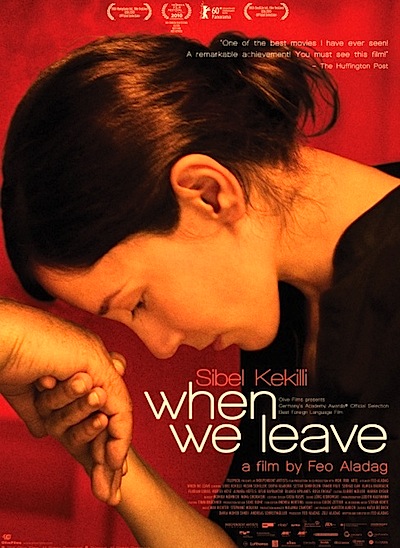By Joe Bendel. Like many Turkish immigrants, Umay came to Germany in search of a better life for herself and her young son Cem. In their case, that meant getting away from her abusive husband Kemal. Unfortunately, she finds the traditional baggage from her home country is hard to shake in Feo Aladag’s When We Leave (trailer above), Germany’s unfairly overlooked official submission for best foreign language Oscar consideration, which opened Friday in New York and elsewhere.
Due to Leave’s framing device, we start the film under the assumption that things will not work out for Umay. Actually, we have no idea. A strikingly beautiful woman, Umay’s husband uses her as a domestic slave. However, when he begins terrorizing their son as well, Umay decides to flee. At first, her family in Germany is delighted to see her, but they keep asking about Kemal. When her father Kader and older brother Mehmet learn the truth, they have only one word for Umay: “whore.”
 Despite Umay’s protests, Kader makes it unequivocally clear Umay must return to her rightful owner, or consider herself banished from the family. While Umay must protect herself and her son, she cannot turn her back on the only family she has ever loved. Unfortunately, the warning of her friend proves tragically correct—her family will always choose their community over a mere daughter.
Despite Umay’s protests, Kader makes it unequivocally clear Umay must return to her rightful owner, or consider herself banished from the family. While Umay must protect herself and her son, she cannot turn her back on the only family she has ever loved. Unfortunately, the warning of her friend proves tragically correct—her family will always choose their community over a mere daughter.
Leave is a truly intense film that frankly depicts all manner of crimes committed in the name of so-called ‘honor.’ We witness spousal abuse, abduction attempts, stalking, and worse. Yet, for Umay, the emotional isolation for her family is the hardest to bear.
The strikingly beautiful Sibel Kekilli deservedly won best actress honors at last year’s Tribeca Film Festival for her heartrending portrayal of Umay. An active supporter of Terre de Femmes, a German-based non-profit dedicated to Muslim women targeted with physical violence, Kekilli clearly drew from real life in her riveting performance. It is hard to watch at times as her Umay is spat upon (literally and figuratively) by her formerly loving family.
The unblinking intimacy of Aladag’s approach viscerally captures a wealth of unspoken nuances passing between characters. She also elicits some quite accomplished work from her supporting cast. As Umay’s German boyfriend Stipe, Florian Lukas adds a bit of depth to a part that could easily be dismissed as the schmucky nice guy. Yet perhaps the most surprising turn comes from Settar Tanriögen as Umay’s pained father, evoking a sense of high tragedy through Kader’s cowardice and conformity.
Frankly, it is something of a scandal Leave did not even make the nine film shortlist for the best foreign language Oscar. It is a powerful film, featuring a truly brave lead performance from Kekilli. Far superior to the five nominees announced last Tuesday, the remarkable Leave opened Friday (1/28) in New York at the Angelika Film Center.
Posted on February 2nd, 2011 at 9:51am.




